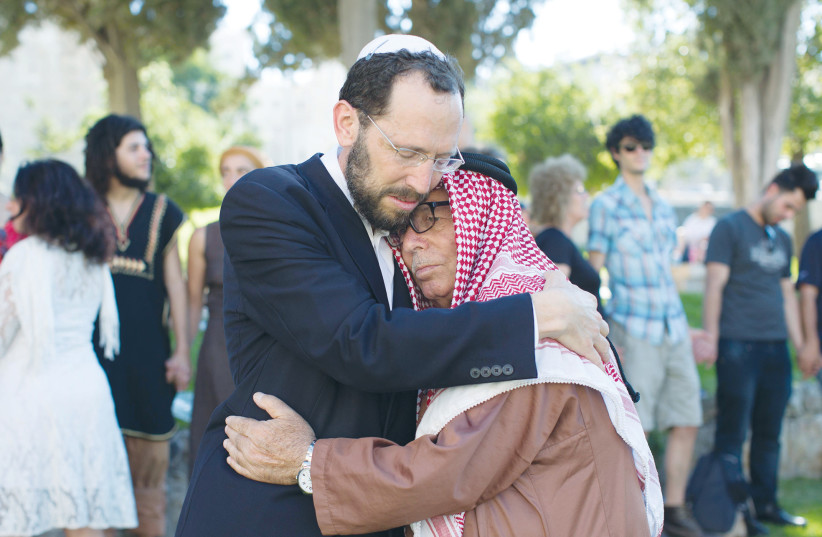The late Holocaust survivor and Nazi hunter Simon Wiesenthal lost 89 members of his family in the Holocaust. When liberated in May 1945 at the Mauthausen concentration camp, he physically crawled to thank his American liberators. He was too weak to stand.
In 1977, when he agreed to Rabbi Marvin Hier’s request to bestow his name on our fledgling institution, Wiesenthal said that he learned many bitter lessons from the Holocaust. “We Jews were virtually alone,” Wiesenthal said. “The world was blind to our suffering. The Jewish people must seek new allies and new friends,” warning, “we can never defeat antisemitism on our own.”
Guided by Wiesenthal’s call to action, we turned to interfaith dialogue. Along the way, we learned some important lessons.
First: To thine own self be true. Friends and enemies will respect you if you are honest about your own priorities. Second: Dialogue is never a one-way street. If you’re seeking partners, you must be there for others in times of need. Third: Rome wasn’t built in a day. Forget Zoom. Interfaith trust and cooperation take time to develop, and your partner may be halfway around the world.

In his statement to a multi-faith conference in Bali, convened in 2007 to counter deadly Islamist terrorist attacks, the late Indonesian president Abdurrahman Wahid, also a spiritual leader of 60 million Muslims, declared: “Religion is supposed to be a blessing for mankind. But let’s be honest, today it is too often a curse.”
That far-off gathering of Muslims, Hindus, Jews, Christians and Buddhists showed that people of faith can be a source of light and hope. There was a remarkable op-ed by president Wahid and Rabbi Israel Meir Lau, then Israel’s chief rabbi, denouncing Iran’s state-sponsored Holocaust denial.
Hundreds of young Muslim and Hindu teachers sat in awe as Holocaust survivor Sol Teichman quietly related the odyssey of a Jewish teen trapped in hell. Many more watched Teichman via satellite TV beamed live across the Muslim world, with simultaneous Arabic translation. The tears and hugs that followed showed the impact when you put a human face on mind-numbing statistics.
CLOSER TO home and a 2,000-year trail of tears, crusades, pogroms and genocide, we pursued relations with the Vatican, which included seven meetings with popes. A word to the wise: The wheels of change turn slowly in Vatican City. But from our first meeting with John Paul II in 1983 to our recent audience with Pope Francis, we have witnessed historic changes.
Earlier popes, including Pius XII, were opposed to a Jewish state on theological grounds. Pope John Paul II changed all that, even depositing a prayer for peace and reconciliation in the hallowed cracks of the Western Wall.
Just a number of days ago, during our audience with Pope Francis, he received a facsimile of the 1919 “Hitler letter,” typed and signed, wherein Hitler revealed his core belief that Germany needed a government policy leading to the “uncompromising removal of the Jews altogether.”
The day after our meeting, Francis ordered the release by the Vatican archives of all World War II-era pleas by Jews to Pius XII, begging for him to speak out against Hitler’s genocide – pleas that largely fell on deaf ears.
Here at home, the imperative to have allies to fight surging antisemitism is critical.
Recently, I spoke to 1,000 leaders at the Christians United for Israel (CUFI) convention about how Christians and Jews can work together in the age of social media. CUFI is led by the powerful and irrepressible Pastor John Hagee. It has over 11 million members – all lovers and supporters of Israel.
The speaker before me, Joseph Borgen, was the victim of a violent attack by pro-Palestinian protesters in New York City. He quietly recounted the personal toll the unprovoked attack had. He pleaded for a new coalition that would be there for all victims of hate crimes – regardless of religion.
The speaker following my presentation thanked CUFI for its emergency $8 million grant that enabled the Jewish Agency to evacuate thousands of Jews out of harm’s way from Vladimir Putin’s invasion of Ukraine.
We cherish Pastor Hagee and all Christians inspired by the Jewish people’s return to Zion. But we must somehow also acknowledge that church-goers are being taught that it is a sin to be Christian and a Zionist.
In today’s world, no one can guarantee the future of any faith community. We must therefore be there for each other – to protest when any house of worship is attacked, when faithful sequester at home, too afraid to gather for communal prayer. And all of the children of Abraham must work together to deepen and expand the first signs of peace in the Middle East.
You can hear and see the early fruits of interfaith dialogue sprouting from a Saudi blogger, Mohammed Saud, who is constantly posting about peace between our people. His vision is real peace. With God’s help and our collective commitment, this will be the future.
The writer, a rabbi, is associate dean and director of global social action for the Simon Wiesenthal Center. He is the co-chair of the US Commission on International Religious Freedom.
